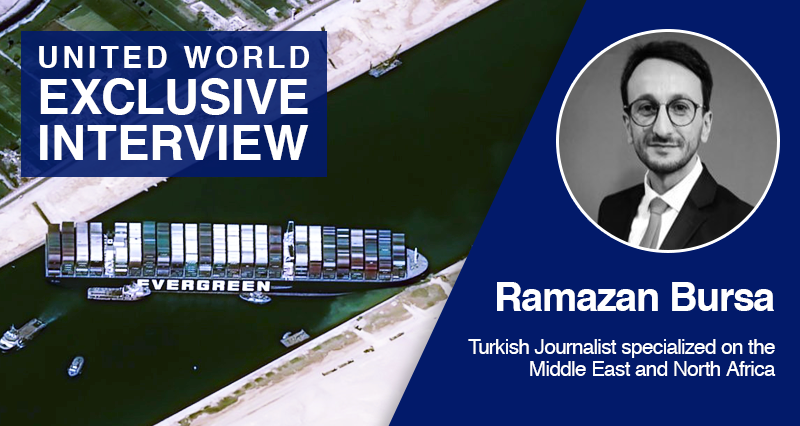The Suez Canal has been closed for days now, causing great delays in global trade and rerouting of international maritime traffic. United World International has spoken to Ramazan Bursa, Turkish Journalist focused on the Middle East on the consequences of the canal’s closure, its historic background and competing geostrategic and logistic plans of Israel.
Ramazan Bursa is a Turkish journalist working on the Middle East in general and on Iran, in particular. Bursa represented Al-Quds Tv in Iran for many years. He also worked for TV 5.
The Suez Canal has been closed to maritime traffic for days now. What are the effects of this closure?
The Panama-flagged container ship Ever Given, 400 meters long 59 meters wide, has lost control in the Suez Canal and run aground, closing the canal to all ships passage. It is noteworthy hat nearly 10% of global maritime trade passes through the 193-km long Suez Canal.
The Canal’s closure causes an estimated cost of 10 billion dollars to global trade – daily! The Suez Canal is also very important in global oil trade and shipping, and currently more than 300 ships are waiting at the entrance to pass through.
Given the Canal’s importance for international oil transport, its enduring closure is expected to have effect on global oil prices too. In the meantime, international maritime traffic reporting websites already published data, which indicates that several ships have changed route.
For example, it is reported that the LNG carrier Pan Americas changed route, has given up the passage through the Suez Canal and instead decided to round the Cape of Good Hope, travel around the African continent to reach its destination.
Reports argue that a long closure of the Suez Canal will affect the US less, laying a much heavier burden on the European economy. The prices of goods, whose delivery is delayed, rise by 0.6 to 2.3% per day of delay, according to some sources. For the time being, the closure has caused a 7% rise in global oil prices.
The Suez Canal has been a matter of conflict historically too. Can you give us the background?
The Suez Canal was constructed in 1869 during the Ottoman reign over Egypt. Later, in Mid-20th century, the then President of Egypt, Gamal Abdel Nasser asked the US and Britain for credit to finish construction of the legendary Aswan Dam. But the US and Britain rejected the plea, arguing that Egypt was receiving weapons from the Soviet Bloc and had a hostile position towards Israel.
Gamal Abdel Nasser in turn declared the nationalization of the Suez Canal in 1956. Britain and France reacted harshly to the Egyptian decision. After Israel has started to occupy the Sinai Peninsula, the two countries wanted to deploy military to the region.
Britain and France, whose “offer” to send military forces to stop the war was rejected by Nasser, attacked Egypt and continued air raids until the 5th of November. During these attacks, British-French forces gained control of the Suez Canal.
May the closure bring back to debate plans competing with the Suez Canal?
The Suez Canal has kept its strategic importance for global trade since 1869. Recently, Israel has started attempts to diminish the canal’s importance by constructing a so-called “Peace Train”. Israel thus also aims to integrate itself to the region.
The railroad project that was presented to public in 2018 plans to connect the Israeli port Haifa with Dubai. It is thus a centerpiece in Trump’s Abraham Accords and the Israeli-Arab normalization. The Israeli Transport Minister, Yısraeli Katz, then presented it to the authorities in Oman.
The Israeli Minister declared then that the “Peace Train” would serve as a bridge between Europe and the Gulf, with Jordan becoming a major logistics hub. At that time, Israel had no diplomatic relations with various countries on the trail, a situation prone to change today. The project planned a track of approximately 1500 km, starting from Haifa in Israel, passing through Jordan, Saudi Arabia and the UAE and ending in Dubai. Katz then declared that the US President Trump supported the project too.

















Leave a Reply